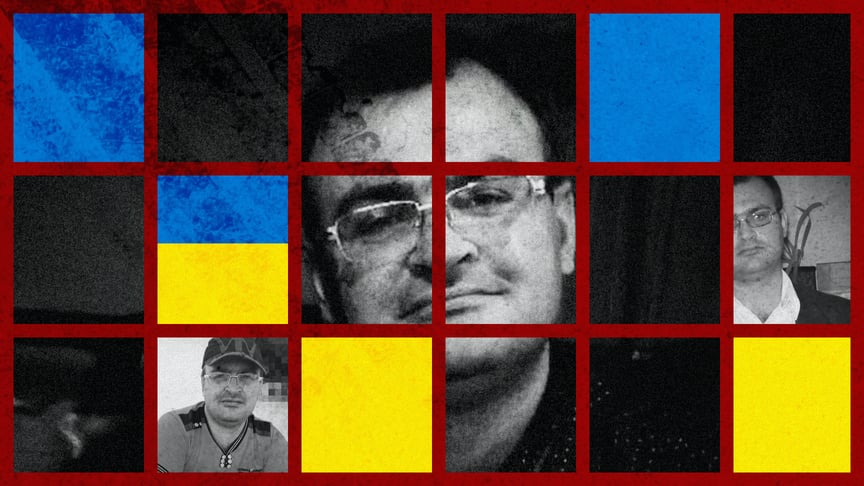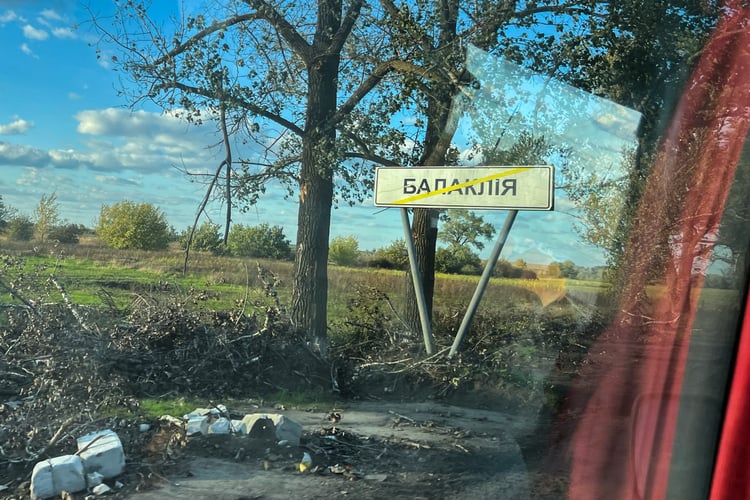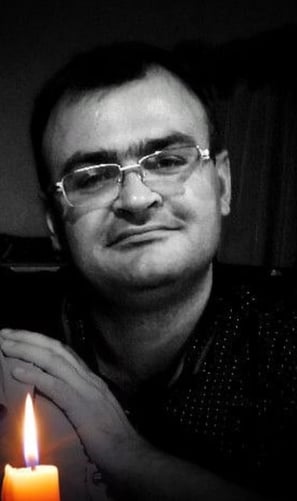Rebel to the end: The story of family of underground fighters from Balakliia

On September 8, 2022, Ukraine’s Defense Forces liberated Balakliia in Kharkiv Oblast. The city had been under Russian occupation for six months. In the first days of liberation, locals confirmed the existence of several torture chambers where Russians detained civilians. The main one was the Balakliia police station. At least 200 people passed through it. Former captives recount brutal torture, beatings, and sexual violence.
According to the Kharkiv Oblast Prosecutor’s Office, at least four people were killed there. Two, per law enforcement, died after liberation. Former ATO veterans, emergency workers, teachers, retirees, and even a well-known local children’s soccer coach were held there—mostly for their pro-Ukrainian stance.
In August 2022, brothers Maksym and Volodymyr Shelekhan were brought to the station. Maksym, a lawyer, and Volodymyr, a water utility worker, were underground fighters passing information from the occupied city to Ukraine’s Armed Forces. Maksym Shelekhan was among those who didn’t leave the police station alive after torture. Volodymyr survived and is still seeking answers about his brother’s murder, which the Russians tried to conceal.
The story of the Shelekhans, whose name now graces a street in Balakliia, is presented in partnership with the Public Interest Journalism Lab (PIJL).
Russian forces entered Balakliia, Kharkiv Oblast, shortly after the full-scale invasion on March 2, 2022. Gas, electricity, and water began to disappear. Like other blockaded cities, Russians obstructed evacuation and humanitarian corridors. Balakliia’s mayor, Ivan Stolbovyi, initially refused to collaborate with the Russians, but later, according to the regional state administration, he betrayed Ukraine and fled to Russia (he faces treason charges and will be tried in absentia).
Constant shelling drove people into basements. Streets emptied as residents avoided Russian soldiers. Many left for Ukrainian-controlled territories. But some, like the Shelekhan brothers—41-year-old Maksym and 38-year-old Volodymyr—deliberately stayed to aid the resistance and Ukraine’s Armed Forces.
My job in occupation was to be the eyes and ears of our military
On February 24, Volodymyr Shelekhan took his wife and three children to a village near Balakliia, staying there for two weeks. On March 2, he began gathering information for Ukraine’s Armed Forces in the village and returned to Balakliia on March 6.
Before the full-scale invasion, Volodymyr worked as a machinist-operator at the Balakliia Water Utility. During the occupation, he continued going to work.
“First, I could see the entire bypass road—I had to count how many columns and how much equipment passed and pass that to our troops,” Volodymyr recalls. “That was my job in the occupation—to be the eyes and ears of our military in Balakliia.”
Water supply and sewage systems functioned intermittently when electricity was available. Most utility workers had left, leaving only five employees, Volodymyr recalls. The workers did everything possible to ensure residents had water, at least occasionally.
Maksym proposed that Volodymyr work for Ukraine’s Armed Forces. On March 2, he called and said words Volodymyr remembers clearly: “You can refuse, leave—it’s your right. Or stay with me, and we’ll help our troops here in Balakliia.”
Volodymyr agreed without hesitation. He says Maksym was an active person with a firm pro-Ukrainian stance. Before the invasion, Maksym worked as a lawyer at a local agricultural firm, often helping people with legal advice.
On March 21, 2022, Maksym put his wife and 17-year-old son in a car delivering humanitarian aid, and volunteers took them to Ukrainian-controlled territory. His wife begged him to go with her, but Maksym stayed in occupied Balakliia.
“He said, ‘I’m needed here.’ His family was his greatest value; he loved us so much and wanted us to live. My husband believed you can’t abandon your land: who will, if not us? How do you look your children in the eyes when they ask, ‘Where were you, Dad? Did you run away, hide?’” says Maksym’s wife, Yuliia.
On March 24, 2022, Maksym arranged for Volodymyr’s family to leave.
The Shelekhans and a small group of Balakliia residents spent months gathering information about Russian troop and equipment locations. Maksym was the coordinator, maintaining contact with the Ukrainian military.
A plan to paint a Ukrainian flag on the asphalt in an occupied city
The brothers took strict precautions: they moved around Balakliia and its outskirts on bicycles and scooters, using forest and field paths to avoid Russian checkpoints. They used basic phones and frequently changed SIM cards. No one was to suspect what the men were doing.
But their mother, Svitlana, sensed her sons were involved in something dangerous:
“He didn’t let me in on his affairs. But I saw he was riding around, observing, working with computers, phones,” recalls Svitlana Shelekhan.
On the fourth month of occupation, June 23, 2022, around 10 a.m., Maksym rode his bicycle to Volodymyr’s. The brothers were to discuss plans for Constitution Day, June 28.
They planned to paint a Ukrainian flag on the asphalt to show the occupiers that Balakliia had patriots ready to fight, Volodymyr recalls. They prepared yellow and blue paint and discussed which Russian troop locations to pass to Ukraine’s Armed Forces for a festive “firework show.”
After meeting his brother, Maksym returned to his mother’s apartment, where he lived. Svitlana remembers words that burned her like fire:
“He said, ‘They might take me.’ But not so soon: it happened literally an hour later. I told him, ‘Run!’ And he said, ‘Wait, Mom, I need to clean up here.’”
They put a sack over his head and took him away
It was around noon. Maksym was hurriedly wiping something from phones and hiding items. Through an open window, Svitlana heard an unusual noise and a man’s voice shouting her apartment number. She looked out and saw a large military armored vehicle and about a dozen soldiers:
“They were all in balaclavas, of course, with rifles. Russians. They stormed to the fourth floor in a minute, grabbed him, and hit him. He shouted, ‘Glasses!’—and bent down for his glasses. They put a sack over his head and took him,” Svitlana recounts.
With a sack over his head and handcuffed, Maksym was pushed outside and into the armored vehicle. Several soldiers stayed to search the apartment, taking phones and a laptop. They also found Volodymyr’s military ID, sealing his fate. Svitlana was ordered out and put into the armored vehicle.
No sack was put over her head; she saw they were taken to the local Baldruk publishing house, where the occupiers had set up a so-called military police. Her son was taken to the Balakliia police station, where Russia’s FSB operated a prison for Ukrainians. That was the last time Svitlana saw her eldest son, Maksym, alive.
That same day, June 23, around 3 p.m., on the other side of Balakliia, Volodymyr saw a military armored vehicle turn onto his street. He immediately knew: they were coming for him. It was too late to run; fleeing into the forest could mean being shot.
There was a knock at the door. Volodymyr opened it to four heavily armed men in full gear, all in balaclavas. He believes they were Russian military police.
“Volodymyr?”
“Volodymyr.”
“Get dressed, you’re coming with us.”
Three days with hands tied, without food or toilet
On the way, Volodymyr realized he was detained for their underground work. He was taken to the Baldruk publishing house. In the basement, three soldiers brutally beat him for the first time. One, the senior, led the interrogation.
“He put a pistol to my eye right away and started shouting, ‘Answer! What were you doing? Did you know what your brother was doing?’”
Volodymyr answered every question with “I don’t know.” The soldiers pushed him to the floor and beat him with rubber batons and kicked him. Within a minute, he was lying in a pool of his own blood. This was just the start of a cycle of abuse and torture.
For the next three days, he was held in a solitary cell with his hands tied behind his back. He received no water, food, or toilet access. Fortunately, someone had left a water bottle in the cell. With great effort, Volodymyr managed to unscrew the cap with his tied hands and took a few sips.
From the occupiers’ questions during interrogation, Volodymyr understood they had also captured his brother. He later learned his mother was detained in the same building.
The cell where Volodymyr was held was in a large basement, separated from other areas by a wall of crates. From behind it, he heard his mother’s voice: “Vova, are you okay?” They exchanged a few words, encouraging each other.
"I'll shoot you now!"
Svitlana was held for three days in a cell with three men detained for looting. She asked guards to take her to the toilet, but they replied, “Not allowed.”
“They gave us half a piece of bread a day. No toilet; they put some bucket in there,” she recalls.
The occupiers forced Svitlana to write statements about what her sons were doing. She wrote only biographies—hers and her sons’. They demanded Volodymyr’s address. She said he’d left the city. But the Russians learned where he worked, forcing the water utility director to reveal his home.
Svitlana was interrogated twice without beatings, but a soldier in a balaclava threatened her with a pistol:
“‘I’ll shoot you right now.’ I said, ‘Shoot me, but let my sons go.’”
On the third day, Svitlana was released on the condition that she return to the occupiers’ so-called commandant’s office on June 29, 2022.
On the fourth day, Volodymyr was moved from the publishing house to the Balakliia police station. The FSB-run torture chamber held anyone the Russians suspected or hated, as well as those who were reported, Volodymyr believes, including those with ties to Ukraine’s military, police, or state. After liberation, Russian soldiers left behind not only socks and underwear drying in the station’s meeting room but also documents and a flash drive with names of those responsible for “working with the local population.” Journalists from Radio Liberty’s investigative project Schemes recovered their data, and Ukrainian law enforcement issued charges to some.

But that would come later. For now, captives were held for weeks or months in cramped, filthy cells under unsanitary conditions, some without toilets or water, without proper food. And also without the possibility of contacting relatives and receiving medical assistance. They were isolated from the outside world, marking days with notches on walls and doors, Volodymyr recounts.
He was placed in such a cell with six others. There were only three cots, so four slept on the floor. They were allowed to use the toilet once a day at 8 a.m.
“You leave the cell, sacks over heads, holding each other by the shoulder, walking in single file,” Volodymyr says.
No one dared ask for the toilet during the day, as it could lead to beatings or torture. They were fed twice daily, morning and evening, mostly water-based porridge. Seven men got two liters of water a day. After three days in handcuffs, Volodymyr developed deep, infected wounds on his wrists but didn’t ask for medical help—such requests could lead to a deadly beating.
The worst, he says, were the interrogations. During one, without a sack on his head, he partially saw his torturers, whom he believed were FSB. All wore balaclavas. They beat him with a rubber baton, then used an electric shocker, demanding he reveal how his brother coordinated Ukrainian Armed Forces strikes and admit to helping him.
“He pulls out the shocker—same questions again. I say, ‘I don’t know anything.’ They started shocking my shoulder. At first, it wasn’t too bad. Then—it must’ve been turned up—it got serious. I was shaking hard,” Volodymyr recalls.
Barely alive, he didn’t confess or testify against Maksym. Then the brothers were brought face-to-face.
Face-to-face for the brothers
Volodymyr recalls how guards brought Maksym into the interrogation room. His appearance showed he’d been tortured brutally and for a long time.
“They led him in, holding him under his arms because he could barely move his legs. He was beaten so badly that he was stuttering; I could barely understand him. He was all blue. Morally and physically broken,” Volodymyr describes his last meeting with his brother.
The Russians questioned Maksym. Volodymyr remembers the dialogue:
“They ask him, ‘Maks, do you want to live?’ He says, ‘Yes.’ ‘Then tell us, did your brother pass you information?’ He says, ‘Yes, I asked him to tell me how many columns passed.’ They turn to me: ‘See, you said you didn’t work with him.’ And then Maks says, ‘I asked him, but he didn’t tell me anything…’ He wriggled out. It was hard for him to speak. They took off his sack, and he saw me. I could see he was in bad shape, his face blue. He had heart problems,” Volodymyr recalls with pain.
The face-to-face ended. Maksym was hit twice with rubber batons and dragged down the corridor, unable to walk.
Volodymyr’s interrogation continued. The senior officer—Volodymyr believes he was in charge—checked his phone, found nothing, and ordered him back to his cell. A few days later, on June 29, at dawn, a guard opened the cell door and shouted, “Shelekhan, out!”
Opening the coffin was forbidden under threat of execution
One of the inmates had a watch; Volodymyr saw it was 6:50 a.m. He was surprised: where could they be taking him so early? No sack was put on his head this time. The guard took him to another cell on the same floor. There, Volodymyr saw his brother in a noose.
“A strange shoelace, a torn T-shirt. The bottom of the T-shirt was hemmed—torn off and made into a noose. And he supposedly hanged himself,” Volodymyr describes.
He lifted his brother; the guard cut the noose.
“We laid the body in the corridor. I’m crying over my brother, of course. An FSB officer comes up and says, ‘That’s it, drag him away!’ They gave me maybe 30 seconds, a minute at most. I didn’t even get a good look at him,” Volodymyr says.
A Russian soldier ordered Volodymyr to run home and urgently find a funeral agency. They returned his documents and released him from prison.
Only one funeral agency was operating in Balakliia. Volodymyr arranged his brother’s burial and began searching for his mother, released days earlier. Svitlana wasn’t home. She had gone to the police station with a care package for Maksym, only to learn of his death. Volodymyr found her there.
The hearse arrived at the police station hours later and left the prison around noon with a nailed-shut coffin, which the occupiers said held Maksym’s body. His brother and mother were forbidden to open it under threat of execution. The coffin was taken straight to the cemetery.
Only his mother, brother, and a friend attended the funeral at the local cemetery. They didn’t dare open the coffin.
Maksym’s family still doesn’t know how he died. No one believes he hanged himself. He was held in solitary confinement, with no witnesses. When Volodymyr lifted him from the noose, he saw Maksym’s hands were tightly bound with a cord. Due to an old injury, Maksym could barely use his right hand, unable to even hold a spoon. His condition during their last meeting was dire; he couldn’t have torn his T-shirt or made and used a noose, Volodymyr is convinced.

The death certificate stated: “Consequence of explosive trauma”
The day after the funeral, a local forensic expert issued a death certificate stating Maksym died from explosive trauma.
His family suspects he was either killed by Russian soldiers or his heart gave out under torture.
Why did the Russians stage this “performance” around Maksym’s death? His family believes FSB officers reported a spotter “up the chain” but didn’t transfer him in time, so they concealed the killing.
The circumstances of Maksym Shelekhan’s death are under investigation by the Kharkiv Oblast Prosecutor’s Office and the Security Service of Ukraine under the article “Violation of the Laws and Customs of War.” Prosecutors believe Maksym’s suicide was staged to hide a war crime. The family was barred from opening the coffin to prevent them from documenting torture marks as evidence. Identifying those responsible is complicated because Volodymyr didn’t see faces or hear call signs, prosecutors say.
But the informal “Balakliia” Russian military grouping, comprising various unit members, is considered responsible, prosecutors say. Charges have been issued to commanders—Russian Baltic Fleet Major General Andrei Ruzinsky and Ivan Popov, who later replaced him. Law enforcement believes the police station torture chamber was used by FSB and private military company fighters. 88 criminal cases are being investigated regarding it.
Volodymyr cooperates with the investigation, desperate to know how his brother died and who is responsible:
“They didn’t just need to crush one Maksym; they wanted to crush the intelligentsia. These are people whose minds work, who can harm the occupiers. He was an activist. He’d been like that since school. His school nickname was Povstanets (‘Rebel’). And he stayed one.”
“My husband always said, ‘The main thing in life is to overcome yourself,’” says Yuliia. “That’s why the Russian occupiers killed him. He said life is short; you need to do something for others.”
Maksym’s 20-year-old son, Oleksandr, is studying programming at a Kharkiv university. He is very proud of his father. Maksym once promised to buy him an electric guitar for his 18th birthday. It was bought without Dad.
Military sources told Volodymyr that thanks to the brothers’ coordination during the occupation, Ukraine’s Armed Forces struck dozens of Russian army targets, destroying or damaging equipment.
A street in Balakliia is named after Maksym Shelekhan.
Author: Viktoriia Balytska
- Share:
